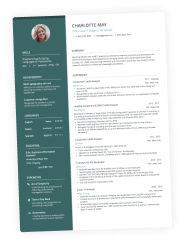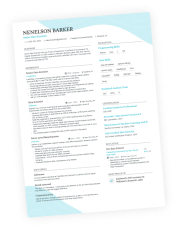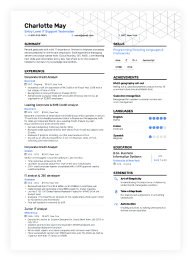In today’s competitive job market, most companies receive tons of applications on a monthly basis.
And the fact is, hiring managers simply don’t have the time to go through all of them carefully.
That’s why, most hiring managers only scan each application for about 5–6 seconds before deciding whether to keep on reading.
So, you can easily imagine how crucial it is to grab the hiring manager’s attention right away.
One of the best ways to grab the hiring manager’s attention is by crafting an effective summary for your CV.
However, you might ask yourself many questions about it.
We are here to help you by exploring the following questions:
- What is a CV summary?
- Why is a CV summary important?
- How to write a CV summary?
And we are going to wrap things up by providing you with some great CV summary examples to get you started on your own.
So, if it all sounds good, let’s dive in.
Is your resume good enough?
Drop your CV here or choose a file. PDF & DOCX only. Max 2MB file size.
What is a CV summary?
Before we go any further, you need to first understand what exactly is a CV summary.
A CV summary is the first section of your CV, placed right after your contact information.
And as its name might tell you, it is a summary of everything you have showcased throughout your CV.
It should mainly focus on your work experience, skills, and qualities.
A good CV summary should be about 3–4 sentences long, and should include the following information:
- Your years of work experience and current job title
- A short list of your biggest achievements
- A short list of your most important and relevant skills
Why is a CV summary important?
Now that you know what a CV summary is, let’s think about why is it actually significant.
As we mentioned before, companies receive tons of application – they can receive hundreds of applications for a single position.
This makes the process of reviewing whether candidates are fit for the job very time-consuming.
To make the task more manageable, many hiring managers choose to scan through the CVs rather than read each one carefully.
And that’s where your CV summary plays an essential role to increase your chances of getting the job.
As your CV summary summarizes your work experience and all your qualities, it is the perfect short section to grab the hiring manager’s attention and make them keep on reading.
How to write a CV summary?
Now that you know what a CV summary is and why it is so crucial to take the time to craft it well, it is time to learn how to do so.
You can achieve a great result for your CV summary in just 5 simple steps.
Carefully read through the job description
Before you start crafting your CV summary, it is essential for you to take the time and read carefully through the job description one more time.
The reason for that is that you would want to tailor your CV according to each and every job position you apply for to maximize your chances.
Make sure you use the same keywords as the job posting, and mention all the key skills the hiring manager would be looking for in your CV summary.
You need to make sure that the hiring manager would be able to spot that you meet all the job’s criteria from a quick glance.
Specify your current job position
No matter your reasons for seeking new job opportunities, you should definitely mention your current job and responsibilities.
You can only get further ahead with that information, as it can show strong work ethic, even if you are working in an unrelated field.
However, there are other situations that we should also cover, in case you are not currently employed.
If you are currently a full-time student, you would want to focus on your field of study and concentration.
And finally, if you are currently unemployed for a different reason, you can always highlight any volunteer work or other activities you take part in.
Highlight your past work and academic experiences
As your work experience is arguably the most important part of your CV, you need to make sure you highlight its best entries in your CV summary as well.
However, make sure you don’t just copy your whole work experience section there. Remember – the CV summary should be 3–4 sentences long, so focus only on the most relevant.
In case you don’t have extensive work experience, or you don’t have any relevant entries for the position you are applying for, you can always consider highlighting some of your academic past in the same manner.
Showcase your skills set
Once you have already highlighted your work and/or academic experiences, it is time to also include some information from the last crucial section from your CV – your skills.
This is especially important if you are applying for a position in information technology, engineering, or any other scientific field.
For these roles, you would want to highlight all the relevant technical skills you possess, and you can also mention any soft skills or personality traits if you consider them relevant.
Mention a key professional achievement
Finally, you would like to end your CV summary strong, and to do so in the best way, you can always mention a key professional achievement.
When choosing what achievement to share, make sure it is official and measurable, so that you would be able to prove actual results to the hiring manager.
If you have won any awards, you should definitely share these too, as they can be great evidence of your expertise.
CV summary examples
And now, as promised, we have prepared for you some CV summary examples to get you started on your own.
To make it even easier on you, we have prepared one for a few sectors that you might be interested in.
Information technology
Engineering
Project management
Finance
Takeaways
We are all done, now you understand what a CV summary is, why is it important, and how to craft one perfectly.
Let’s go through all the steps you need to take to craft the perfect CV summary one more time:
- Carefully read through the job description – make sure you use keywords from it and highlight skills that the hiring manager would be looking for
- Specify your current job position – or if you are currently a student, or unemployed, mention your relevant activities
- Highlight your past work and academic experiences – this way you focus on the most essential information the hiring manager would be most interested in right from the start
- Showcase your skills set – add in your top relevant skills, so that the hiring manager would know that you are the right person for the job
- Mention a key professional achievement – finally, showcase a great achievement of yours, but make sure it if official and measurable, so that you can prove it
Now that you know all that, it is time for you to craft your own CV summary, and grab the hiring managers’ attention in no time.



